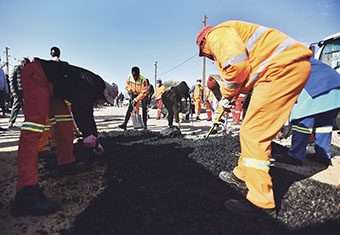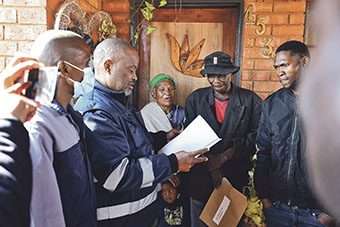With an almost eerie coincidence, windy and dusty weather conditions greeted North West government officials in Schweizer-Reneke for the launch of “Thuntsha Lerole”.
Acting Premier Nono Maloyi describes Thuntsha Lerole, a Setswana phrase aptly meaning “hard at work”, as a two-year-old Accelerated Service Delivery Plan (ASDP) that is centered on prioritising the roll out of key infrastructure projects across the province.
Premier Bushy Maape launched the government’s plan in December 2021 to give all citizens equitable access to necessary services, regardless of their socioeconomic status.
Further, ASDP aims to protect existing jobs and create new ones, while addressing the negative impact of violent protests on private businesses and infrastructure.
On Friday, residents of Schweizer-Reneke’s Ipelegeng township were next to experiencing the coordinated ramp-up of service delivery, and the weather gods seemed to approve.
Maloyi said the plan aimed to expedite service delivery and address the social challenges faced by communities.
“The initiative aims to mobilise communities to address service delivery challenges and provide practical solutions,” he said.

The provincial government focused on areas such as water provision, sewage spillage, rubbish dump removal, pothole repair and high-mast light fixing.
All provincial departments and municipalities were expected to conduct analysis and develop intervention plans for services required in specific districts.
Maloyi said the outcome would land on the provincial technical team’s desk with a list of projects in the implementation phase.
The provincial intervention coincides with the Section 154 partial administration of local municipalities in Mahikeng, Rustenburg, Madibeng, JB Marks, Matlosana and Naledi for 12 months.
During that period, the focus turns to administrative areas and financial recovery plans. The troubled municipalities stand to be assisted with tasks such as patching potholes, clearing illegal dumping sites, removing litter and rubbish, and developing service delivery capacity.
In the near future, said Maloyi, the programme would reach other districts, including Bojanala-Platinum (Madibeng), Dr Kenneth Kaunda (Maquassie Hills), and Ngaka Modiri Molema (Tswaing).
Maloyi said municipalities would also work on service delivery backlogs every Friday.
Behind the ASDP is the government’s recognition that poor basicservices are a social crisis that can become uncontrollable and undermine government authority.
Communities are impatient and expect urgent resolutions. The ASDP appears to be the most effective intervention in addressing these challenges, which require urgent attention.
In crafting the initiative, the North West government dubbed ASDP a practical response to communities’ actual demands to unlock service delivery in municipalities.
Initial interventions focused on water provision, the clearing of sewage spillage, the removal of rubbish dumps, the repair of potholes, and the fixing of high-mast lights. Among the additions were electricity interruptions, the functionality of municipal councils, and interventions in disasters.
The ASDP was launched in Coligny (Ditsobotla Local Municipality) in December 2021.
Part of the launch was a two-week programme to reseal potholes, re-gravel roads, resolve sewer leakages, identify blocked and abandoned projects, and resolve funding challenges.
Maape used the State of the Province Address (Sopa) in 2022 to confirm ASDP as a policy directive with defined intervention priorities.
The North West hosted President Cyril Ramaphosa during the relaunch of the Presidential Imbizo in March 2022 in Mahikeng, which boosted ASDP through additional resources and interventions from the national government.
The key post-imbizo interventions included the N12 road resealing project around Klerksdorp and Wolmarandsstad.
In 2023, the Sopa provided firm policy commitment and resources for clear projects to be implemented and feedback.
The North West government learned through the ASDP that suitably qualified personnel and sufficiently competent officials were either absent or overwhelmed by other related activities.
“This negatively impacts meaningful service delivery interventions,” according to the ASDP concept document.
It continued: “Some even struggle to pay salaries at the end of each month, and all of them find it difficult to prioritise service delivery, whether maintenance or new capital projects”.
Municipalities also lacked the requisite equipment and machinery to maintain and repair their infrastructure.
“The little hand-operated tools in the possession of some municipalities will take many years to achieve any meaningful repair work.”
Maloyi said on Friday that communities demanded reliable and uninterrupted service provision. He said communities did not accept explanations of the roles of each government sphere in service delivery.
“They want solution-driven initiatives on these challenges and expect the provincial government to intervene in instances where municipalities cannot provide services.”
He concluded: “Therefore, these challenges must be nipped in the bud as the provision of basic services is enshrined in our constitution and must be upheld.”
Among the activities on Friday, the Department of Public Works and Roads cleaned illegal dumping sites, assisted Mamusa Municipality with a cherry picker to repair street lights, bladed gravel streets and patched potholes in four streets in town.
The Department of Economic Development, Environment, Conservation, and Tourism conducted compliance inspections in 10 tuck shops after consumer complaints, including disclosure of prices or services, product labelling and trade descriptions, and issuing of sales records. Up to 10 liquor outlets were also checked for compliance, and four were issued fines in the amount of R7500.
The offences included failure to keep documents, operating as off-sales for consumption, failing to keep a bona fide restaurant, renting out a license, and failing to appoint a manager. One outlet was closed for failing to produce the license when warned several times by the Provincial Liquor Trade Inspector. Neighbors were also complaining about loud music (nuisance) emanating from the outlet.
One hundred and thirty-five community members enquired about the registration of businesses and support, in the form of empowerment fund, business licensing, consumer and liquor regulations.
The department donated 50 wheelie bins to indigent households in Ipelegeng. Future plans include a service delivery blitz and training on business management before the end of August. The Department of Education provided five schools with fridges to be utilised for School Nutrition Food items.
Follow @SundayWorldZA on Twitter and @sundayworldza on Instagram, or like our Facebook Page, Sunday World, by clicking here for the latest breaking news in South Africa.



